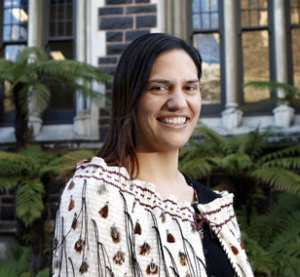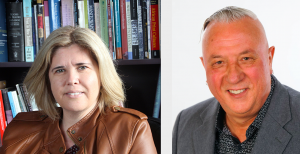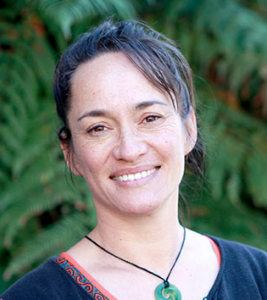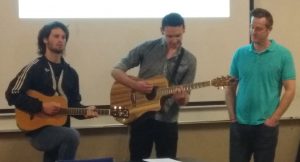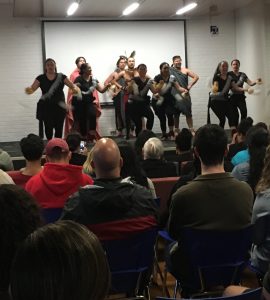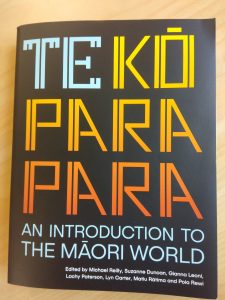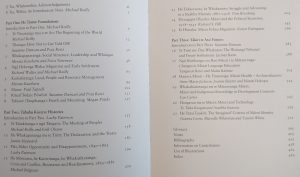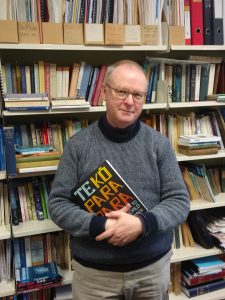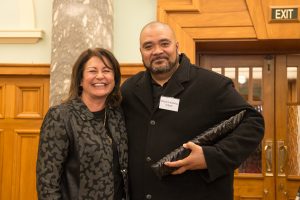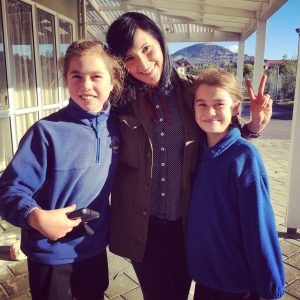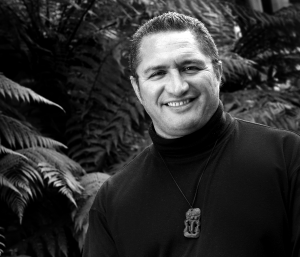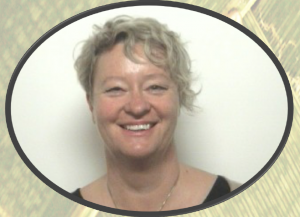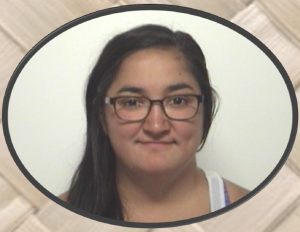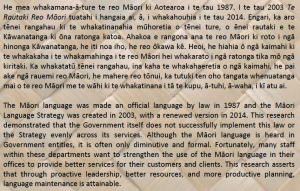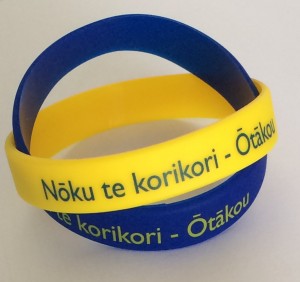Te Tumu in this year’s Marsden Round
This has been a great year for research in Te Tumu. Every November Te Pūtea Rangahau a Marsden (Marsden Fund), run by the Royal Society Te Apārangi, announces its forthcoming research grants. Winning a grant is a two stage process, with applicants having to get past a preliminary round, then develop their applications for the second round; they have about a 10% chance of success in the Humanities and Social Sciences panels. There are six successful applications within the Division of Humanities, three of which have a Te Tumu connection.
Dr Karyn Paringatai‘s project “E kore au e ngaro! The enduring legacy of whakapapa” ($823,000, Social Sciences panel) looks at how the knowledge of whakapapa can impact on health, with particular reference to Māori affected by the CDH1 cancer-causing gene. Click here for more information. Professor Parry Guilford, Director of Otago’s Centre for Translational Cancer Research, is an associate investigator on the project.
Associate Professor Lachy Paterson is a principal investigator alongside Associate Professor Angela Wanhalla (History Department) on “Te Hau Kāinga: Histories and Legacies of the Māori Home Front, 1939-1945” ($746,000, Social Sciences panel), exploring the lived experiences of Māori who remained in New Zealand during the Second World War. Click here for more information. Although the project begins next year, one of our undergraduate students, Haeata Watson, has already started a project looking at Ngāti Kahungunu experiences, funded through a Ngā Pae o te Māramatanga Summer Internship.
Both Karyn and Lachy are based in Te Tumu’s Māori Studies programme, occasionally teaching into the Indigenous Development programme. Karyn also coordinates the Master of Indigenous Studies programme.
Professor Merata Kawharu, who until recently held an adjunct position within Te Tumu but is now based at the Centre for Sustainability, was also successful. Her project, “A question of identity: how connected are Māori youth to ancestral marae, and does it matter?” ($605,000, Humanities panel) will investigate the relationships that young Māori have with their marae. Click here to find out more. Merata with be working with associate investigators, Dr Stephen McTaggart (University of Auckland), former Dean of Te Tumu, Professor Paul Tapsell (now at the University of Melbourne) and Dr Krushil Watene (Massey University).
Special thanks to Marjoleine Righarts, Research and Enterprise’s Research Advisor for Humanities who helped immensely with all the applications.
Te Tumu’s Postgraduate Graduands
Te Tumu would like to congratulate its four postgraduate students who will be graduating this December.
Roma-Kiritahi Simmons-Donaldson (Ngāti Porou, Taranaki, Ngāti Tūwharetoa) is graduating with a BA(Hons) in Māori Studies. Her dissertation, “Walking in two worlds – Te reo Māori in urban New Zealand” was supervised by Dr Karyn Paringatai.
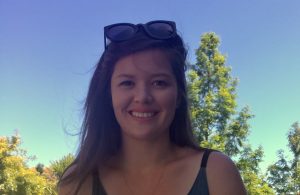 Abstract: The aim of this dissertation is to examine ways in which te reo Māori (the Māori language) can exist in urban New Zealand. Specifically, it will outline a history of te reo Māori, before looking at different ways in which language can be acquired and developed in an urban environment. It will then analyse ways in which te reo Māori has enabled Māori people to negotiate their place in urban New Zealand, in the absence of those environmental stimuli that traditionally inform and enhance a Māori identity and worldview. Central to this dissertation is the concept of intergenerational language transmission. As such, the experiences of my grandmother, mother, and myself will be presented throughout this dissertation to provide context, and to illustrate the interaction between urban migration, language, mechanisms of language acquisition and development, and identity, in a way that contextualises and enriches the literature.
Abstract: The aim of this dissertation is to examine ways in which te reo Māori (the Māori language) can exist in urban New Zealand. Specifically, it will outline a history of te reo Māori, before looking at different ways in which language can be acquired and developed in an urban environment. It will then analyse ways in which te reo Māori has enabled Māori people to negotiate their place in urban New Zealand, in the absence of those environmental stimuli that traditionally inform and enhance a Māori identity and worldview. Central to this dissertation is the concept of intergenerational language transmission. As such, the experiences of my grandmother, mother, and myself will be presented throughout this dissertation to provide context, and to illustrate the interaction between urban migration, language, mechanisms of language acquisition and development, and identity, in a way that contextualises and enriches the literature.
Future plans: “I have just accepted an offer to undertake PhD study at the University of Otago, which will look to fill a gap in the conversation surrounding bilingualism and intergenerational language transmission, and explore in depth the journey of language transmission between second language speaking parents and their first language speaking children. It is my hope that this thesis will help to increase our collective understanding of the intersection of these two stark pathways of language acquisition, and help whānau who are looking to do the same.” Dr Karyn Paringatai and Professor Poia Rewi will supervise Roma’s doctoral thesis.
Pia Cristóbal Kahn undertook the thesis pathway for her Master of Indigenous Studies degree. Her thesis, “Sacred Katuiran: Decolonial Sensibility in the Katipunan Papers / An ‘indigenist hermeneutic’ of 19th century Tagalog revolutionary texts” was supervised by Professor Poia Rewi.
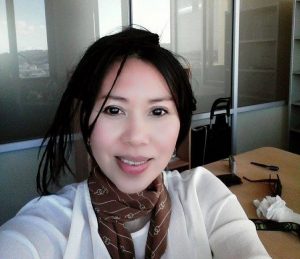 Abstract: Indigenous meanings and renderings tend to be forgotten and buried, and even erased, by non-indigenist interpretations and translations. This is a case study of an ‘indigenist hermeneutic’ approach to a re-translation of the “Kartilya” and other selected texts authored by members of the Katipunan, a 19th century revolutionary movement against Spanish colonial rule in the Philippines. The Tagalog word katuiran, which is often translated to ‘reason’, in support of a prevailing narrative in Philippine historiography that credits the European Enlightenment for primary Katipunan ideas, becomes central to the research as intertextual analyses unearth a variety of its forgotten meanings and usages, and concomitant mistranslations. A comparative conceptual analysis of katuiran and the Māori word tikanga opens up a viable hypothesis for an expanded indigenous meaning of katuiran, that necessitates the re-translation of many passages and other principle ideas of the Katipunan. This re-translation results in a re-narration that depicts an indigenous 19th- century ‘decolonial’ Tagalog movement that sought to delink from European constructs epistemically, ethically and politically; and thus, a re-narration that offers a challenge to a ‘European Enlightenment narrative’ for the Katipunan revolution.
Abstract: Indigenous meanings and renderings tend to be forgotten and buried, and even erased, by non-indigenist interpretations and translations. This is a case study of an ‘indigenist hermeneutic’ approach to a re-translation of the “Kartilya” and other selected texts authored by members of the Katipunan, a 19th century revolutionary movement against Spanish colonial rule in the Philippines. The Tagalog word katuiran, which is often translated to ‘reason’, in support of a prevailing narrative in Philippine historiography that credits the European Enlightenment for primary Katipunan ideas, becomes central to the research as intertextual analyses unearth a variety of its forgotten meanings and usages, and concomitant mistranslations. A comparative conceptual analysis of katuiran and the Māori word tikanga opens up a viable hypothesis for an expanded indigenous meaning of katuiran, that necessitates the re-translation of many passages and other principle ideas of the Katipunan. This re-translation results in a re-narration that depicts an indigenous 19th- century ‘decolonial’ Tagalog movement that sought to delink from European constructs epistemically, ethically and politically; and thus, a re-narration that offers a challenge to a ‘European Enlightenment narrative’ for the Katipunan revolution.
Future plans: “I plan to continue my research on the doctoral level, with a focus on Tagalog cultural conceptualisations, and drawing from the fields of indigenous studies, cultural linguistics, memory studies and oral history.”
Te Tumu also has two staff members who are graduating with their PhDs.
Dr Tangiwai Rewi (Waikato, Ngaati Tiipaa, Ngaati Amaru, Ngaati Tahinga) has completed a doctorate, “Examining traditional Maaori knowledge frameworks and intergenerational knowledge transmission. “Titiro, Whakarongo” – he huarahi ako noo ngaa raa o nehe.” Professor Michael Reilly was the primary supervisor, with Professor Helen May as co-supervisor until her retirement in Dec 2016, and Dr Michelle Schaaf as an Advisor.
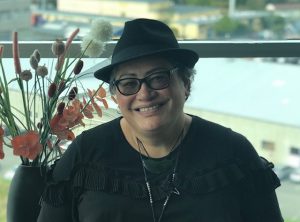 Ariaa: Abstract: This thesis investigates the way knowledge is transmitted inter-generationally, and the teaching and learning methods (or pedagogies) used to do this. The transmission referred to here relates to knowledge about practices associated with the Kiingitanga ‘kingship movement’ of which the Waikato iwi ‘tribe’ have long been the kaitiaki ‘guardians’. The pouwhirinaki ‘participants’ are from the Ngaati Tiipaa and Ngaati Amaru hapuu ‘sub tribes’ from the Port Waikato area; however, participants also came from other hapuu and iwi within the Waikato-Tainui rohe ‘region’.
Ariaa: Abstract: This thesis investigates the way knowledge is transmitted inter-generationally, and the teaching and learning methods (or pedagogies) used to do this. The transmission referred to here relates to knowledge about practices associated with the Kiingitanga ‘kingship movement’ of which the Waikato iwi ‘tribe’ have long been the kaitiaki ‘guardians’. The pouwhirinaki ‘participants’ are from the Ngaati Tiipaa and Ngaati Amaru hapuu ‘sub tribes’ from the Port Waikato area; however, participants also came from other hapuu and iwi within the Waikato-Tainui rohe ‘region’.
I set out to analyse whether there is any correlation between the traditional Maaori knowledge frameworks of old being utilised in the way we learn the roles associated with three domains on the marae ‘communal gathering place’ during three key Kiingitanga events. This thesis explores how learning was undertaken in ngaa whare waananga tawhito ‘traditional houses of learning’ before documenting my participants’ narratives about how they learned their roles. It concludes with my analysis of these findings and offers some recommendations, based on what the participants said, about cultural revitalisation looking forward.
Future Plans: After an enforced leave period from roles and responsibilities in order to complete the thesis, Tangiwai is now relishing the challenge of resuming these expectations. From January 2019 she takes on the 0.5 Academic Dean Maaori position in the Division of Humanities. This is in addition to being the new Co-chair of Poutama Maaori, the Maaori academic staff network across the Otago University campuses which she recently took up in September 2018.
On the research front she is busy implementing one of the translational priorities of her PhD research, Tuupuna Times, which encourages whaanau to record the life stories /narratives of their ruuruhi (elderly women) and koroheke (elderly men). While she has continued to teach her Maaori education papers of MAOR 213, 313 and 413, she also expects to conduct comparative research with two other New Zealand iwi and two other indigenous tribes from Northern America related to her PhD study during her pending Research and Study Leave forecast for the back end of 2020 / start of 2021.
Dr Erica Newman is also graduating, having completed a PhD on Adoption in Fiji. Associate Professors Jenny Bryant-Tokalau and Jacqui Leckie supervised Erica’s thesis, assisted by the Advisory Committee of Professor Michael Reilly and Dr Michaelle Schaaf.
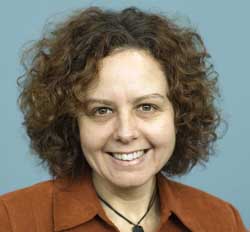 Abstract: The arrival of Europeans in Fiji, from the late 1700s, impacted the established social structures of the indigenous communities, removing what were considered inappropriate social behaviours and introducing concepts and values which altered the societal relationships and status of iTaukei (indigenous Fijians). This included the introduction of colonialist terms and practices of ‘orphan’ and ‘adoption’. Scholars such as Vern Carroll, Ivan Brady and Ward Goodenough have questioned whether the use of these terms were appropriate when referring to the traditional practices of child circulation amongst kin within Oceania. Yet the iTaukei population came to use these terms, practices and their meanings, although not entirely in the same context as the European.
Abstract: The arrival of Europeans in Fiji, from the late 1700s, impacted the established social structures of the indigenous communities, removing what were considered inappropriate social behaviours and introducing concepts and values which altered the societal relationships and status of iTaukei (indigenous Fijians). This included the introduction of colonialist terms and practices of ‘orphan’ and ‘adoption’. Scholars such as Vern Carroll, Ivan Brady and Ward Goodenough have questioned whether the use of these terms were appropriate when referring to the traditional practices of child circulation amongst kin within Oceania. Yet the iTaukei population came to use these terms, practices and their meanings, although not entirely in the same context as the European.
This thesis investigates the colonialist perspective of Fiji’s traditional child circulation and introduced European practices of child care, guardianship, adoption and orphanage institutions. The research covers a number of key topics that are relevant for this thesis. It begins with an understanding of Fijian kinship structure prior to, and just after, the arrival of the first Europeans. The research then explores colonial interventions of guardianship (the first being a consequence of the introduced Indian Indentured Labour Scheme). Missionaries brought with them the institution of orphanages and a history of these are explored (today orphanages are now known as Children’s Homes). The Child Welfare Department in Fiji is responsible for the placement of vulnerable children into safe homes. As they are an important part of guardianship and adoption today this thesis provides a history of how this scheme developed into a government department. In 1945 Fiji enacted the Adoption of Infants Act as a formal process for all children of Fiji, regardless of ethnicity, and this research follows the path of creation. Although the Adoption of Infants Act caters for all ethnicities of Fiji, ‘informal adoption’ or child circulation continued and continues to be practised by iTaukei. During the colonial period the colonial government accepted this customary practice as an acceptable form of child care.
This thesis provides a history of adoption and guardianship practices in Fiji during the colonial period of 1874 to 1970.
Future Plans: Erica will continue to work at Te Tumu, teaching and researching.
Undergraduate research through te reo Māori
E kīa ana, he wāhi rangahau te whare wānanga, engari, kāore e waiho ana anake taua mahi mā ngā ahorangi, mā ngā pūkenga, mā ngā ākonga paerunga rānei. Uru ai hoki ngā ākonga paeraro ki roto i ēnei momo mahi. I tēnei hēmeta e toru ngā mahi rangahau i mahi ai ā mātou tauira reo Māori o te Whare Wānanga o Ōtākou.
I mahia ngātahitia te “Kāinga Waewae” e ngā tauira o ngā karaehe reo, arā, he rōpū nō ngā tāngata o MAOR112 Te Kākano, te MAOR212 Te Pihinga, me te MAOR312 Te Māhuri. I tēnei tau ka rangahaua ngā mahi a ngā tini tari o te Kete Aronui (Humanities). He momo whakaaturanga tā tēnā rōpū, tā tēnā rōpū mō te tari i rangahau ai rātou.
Ko tēnei te tau tuatahi i tū ai te pepa MAOR206/306 Ngā Pūkenga Tuhi, arā he kōhi hei whakapakari i ngā pūkenga, i ngā āheitanga e pā ana ki ngā momo tuhituhinga. Tokowhā ngā kaimahi o Te Tumu i whakaako i te pepa nei. Ko te tuhituhi ā-whare wānanga tētahi o ngā kaupapa, kia reri ai ngā tauira mehemea ka tahuri rātou ki te tuhi i ā rātou rangahau o ngā tohu paerunga i roto i te reo Māori. Mō tēnei pepa, ka hangaia e rātou he pānuitanga ānō nei kei tētahi hui rangahau rātou.
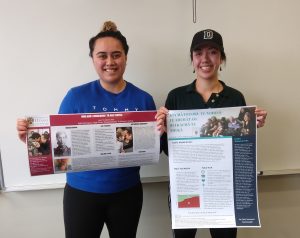
Ka riro i a Lyric Bird (taha mauī) te paraihe mō te pai o te whakapaipai o tāna pānuitanga e pā ana ki te tāmoko; ka whiwhi a Orini Herewini-Macdougall (taha matau) ki te paraihe mō te pai o te rangahau, mō te hunga “ahi matao”, arā, mō te hunga kāore e uru ana ki ngā mahi a ō rātou marae.
I tēnei wiki hoki ka tū te konohete a ngā tauira o MAOR308 Ngā Hākinakina a te Māori, ko Kelly Ann Tahitahi te kaiako, ā, ko Karyn Paringātai te kaiwhakahaere. Nā ngā tauira ngā waiata i rangahau, i tito, i whakarite; ko te “Reaka Z” te kaupapa, arā, ko te whakatipuranga e ako ana ki te whare wānanga ināianei. Tokomaha ngā tāngata i tae mai ki te mātakitaki, ki te whakarongo ki ngā waiata mō ngā āhuatanga o te ao hurihuri o tēnei wā.
In all good bookstores soon!
Ka tangi the kōparapara! Te Tumu staff are delighted with the advance copy of their new book, Te Kōparapara: An Introduction to the Māori World, which arrived a few days ago. This book, published by Auckland University Press, will be out in bookstores next month. Te Tumu will use it as a textbook for our MAOR102: Māori Society paper, replacing Ki Te Whaiao, which staff put out in 2004. But Te Kōparapara will also be of interest to anyone wanting to learn more about te ao Māori.
The kōparapara is the bellbird, the most impressive native songbird, and its tangi is used as a metaphor for the twenty-one chapters in the book. There are three sections. “Te Tumu: Foundations” looks at pre-contact history and Māori culture both from a traditional standpoint, but also in the present. The second section, “Tāhuhu Kōrero: Histories” examines the past from Māori first contacts with Pākehā newcomers to the post-war urban migrations. This leads into “Tākiri the Ata: Futures” which looks at contemporary Māori society and its future. See the contents pages for fuller details. Also click the AUP webpage to access some sample pages.
A number of Te Tumu staff, past and present, have contributed to the book: Michael Reilly, Suzanne Duncan, Poia Rewi, Merata Kawharu, Erica Newman, Paul Tapsell, Megan Pōtiki, Lachy Paterson, Karyn Paringātai, Tangiwai Rewi, Matiu Rātima, Lyn Carter, our postdoc, Gianna Leoni, and former postgrad students Marcelle Wharerau and Tawini White.
We would also like to send out a big mihi to the other authors who also contributed chapters, including from Otago: Richard Walter (Anthropology), Erik Olssen (History, emeritus), Janine Hayward (Politics), Tom Brooking (History), Jacinta Ruru (Law), Anne-Marie Jackson and Hauiti Hakopa (PE), Joanne Baxter (Health); and from further afield, Michael Belgrave (Massey), Richard S. Hill (Victoria), Te Taka Keegan (Waikato) and Acushla Sciascia (AUT). And of course, Sam Elworthy and the team at Auckland University Press.
In particular, we must acknowledge Professor Michael Reilly who led the project, ably assisted by Suzanne Duncan and Gianna Leoni, wrangling all the contributors (and co-editors), communicating with the publisher, and making sure all the little tasks were completed. He mihi nui ki a koe, Michael; mei kore ake koe hei hautū i te kaupapa nei.
Te Tumu Graduates in May 2017
Eight Te Tumu students graduated in the May ceremonies last weekend.
Hine Te Ariki Parata-Walker (Ngāti Porou, Ngāi Tahu) completed a Master of Indigenous Studies (MIndS). Her research topic, supervised by Professor Paul Tapsell, investigated procedures around hahunga (the exhumation of ancestral remains) in modern times. Select Parata-Walker abstract for further details.
Karurangi Salu (Tainui, Ngāpuhi, Samoan) gained a BA(Hons) with her research, entitled “Māku anō tōku nei whare e hanga”, looked at how haka and waiata are used in teaching at Te Whare Kura o Rākaumanga to pass on Tainui history, reo, tikanga and whakapapa. Dr Karyn Paringātai supervised. Select Salu abstract for further details.
Rieko Hayakawa also graduated with a PhD in Pacific Islands Studies.
Congratulations also to our BA graduates.
Alice Anderson (Ngāi Tahu), BA in Indigenous Development/Te Kura Matanui.
Luaipouamalo Gafa (Samoan), BA in Pacific Islands Studies.
Maiora Puketapu-Dentice (Te Āti Awa, Tūhoe), BA in Māori Studies and History.
Tataioterangi Reedy (Ngāti Porou, Te Whānau a Apanui), BA in Indigenous Development/Te Kura Matanui.
Roma Simmons-Donaldson (Ngāti Porou, Taranaki, Tainui, Ngāti Tūwharetoa), BA in Māori Studies.
Te Tumu graduand in the news
Matani Schaaf is featured in the Otago Daily Times [click here] on his PhD journey. It’s a lovely story on both Matani and his son Marckis who graduate today.
Postgraduates Graduating
Te Tumu congratulates our postgraduate students who are graduating this December.
Doctor of Philosophy
Matani Fakatotua Schaaf
Supervisors: Dr. Paerau Warbrick, Prof. Michael Reilly (until 2012, Prof. Brendan Hokowhitu)
Title: Motivation and Burnout in Professional Pasifiki Rugby Players
This thesis examined the participation motivation among professional Pasifiki rugby players. Dominated by Western theories and models, rugby participation research has overlooked the inclusion of a theory or model that is significant to Pasifiki peoples. This research identified what cultural factors exist, that motivate so many Pasifiki peoples to play rugby. This research also highlighted a mismatch between the lived realities of Pasifiki rugby players’ experiences of motivation and burnout, compared to the lived realities of Palāngi rugby players. The most notable outcome, was that Pasifiki rugby players’ experiences were dramatically intensified, by familial, cultural, spiritual and financial obligations; which manifested in burnout, mental illness, substance abuse, binge drinking and failed attempts at suicide.
Master of Indigenous Studies
Te Tumu also has two Master of Indigenous Studies (MIndS) students graduating.
Nurul Sultan, supervised by Dr Lyn Carter, researched “The Relevance of Indigenous Knowledge in Contemporary Research Methodologies”.
Nikki Walden (Taranaki, Te Āti Awa), supervised by Assoc Prof. Merata Kawharu, undertook her MIndS research on “Āhurutanga: the practice and application of a customary Māori principle within a Māori tertiary context. Mā te whakaharatau e tika ai.”
University of Winnipeg student’s blogpost on Otago
Dunedin might be at the “bottom of the world” but we still have people prepared to make their way down here. One such person was Anna Huard, a second-year student in the University of Winnipeg’s MDP (Master’s in Development Practice) programme. While here Anna spent time at Te Kura Kaupapa Māori o Ōtepoti, and with people from Te Tumu. Click here to read about her experiences at Otago from the “University of Winnipeg’s MDP students blogging from the field” site.
He rongo
Aroha mai! A belated roundup of Te Tumu research news.
In July we were treated to Poia Rewi’s Inaugural Professorial Lecture, held to celebrate his ascension to this tūranga rangatira within the university. The title of his talk was “Hoka : Motivators of Time”, a tour alongside Poia as he recounted his own academic journey, and his ZePA model of developing positivity around the use of te reo Māori. This was well attended by Poia’s whānau, staff and students, as well as many from the community, and was capped off with haka, waiata and karakia. The lecture can now be viewed on ITunes U.
In July Te Tumu were privileged to host Professor Michael Harkin as a William Evans Fellow. Professor Harkin, a cultural anthropologist and inaugural editor of Ethnohistory, gave several talks: a public lecture “The Trump at the End of the World: Monsters and Marvels in our Parlous Age”, in which he brought his knowledge of societies past and present together, and a departmental seminar, “‘The Emotional Archive’: The case of Residential Schools in Canada”, in which he examined ‘the relative lack of negative narratives [he] elicited…during fieldwork in British Columbia in the 1980s–2000s’, while also exploring ‘various forms of social memory, proposing the notion of an “emotional archive” that contains non-narrative memory traces’.
It is always great when our students gain their postgraduate degrees, after months or years of working on, and writing up their research. We had three such students graduating this August: Sandra Spence (Pākehā) and Raaniera Te Whata (Ngāpuhi, Ngāti Porou, Te Whānau a Apanui, Airihi) with the Master of Indigenous Studies, and Gianna Leoni (Ngāti Kurī, Ngāti Takoto, Itariana) with a PhD.
Dr Lyn Carter supervised Sandra, whose research was on “Kāi Tahu Chinese Unions and Identity in Otago and Southland/Murihiku”; Associate Professor Merata Kāwharu supervised Rāniera (“Tautoro, tū te ao, tū te pō (The endurance of Tautoro heritage): Investigating challenges and opportunities”); Professor Poia Rewi and Associate Professor Lachy Paterson supervised Gianna (“Mā te Taki te Kāhui Ka Tau: Te Waiaro ki te Reo Māori i ngā Hinonga Kāwanatanga”) who wrote her thesis in te reo Māori. Gianna is teaching MAOR312: Te Māhuri 2 this semster.
ZePA research behind Māori language initiative at university
“Nōku te korikori” is a new initiative to help promote and normalise te reo Māori on campus, based on the ZePA model.
Developed by researchers Professor Poia Rewi, Dean of Te Tumu, and Professor Rāwinia Higgins (former Te Tumu staff member and now Head of School of Māori Studies at Victoria University), ZePA stands for Zero->Passive->Active, in which individuals might “right-shift” to a more active use of te reo Māori. The principles behind this model are explored in the book, The Value of the Māori Language: Ngā Hua o te Reo Māori.
“Nōku te korikori”, spear-headed by Tangiwai Rewi, the coordinator of Te Tumu’s Māori Studies programme, encourages learners and speakers of te reo Māori to don distinctive wristbands so that other learners and speakers can easily identify people who are receptive to a kōrero i roto i te reo rangatira. For full details check out this Otago Bulletin article.

